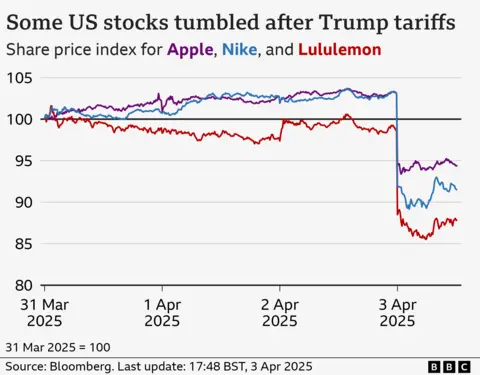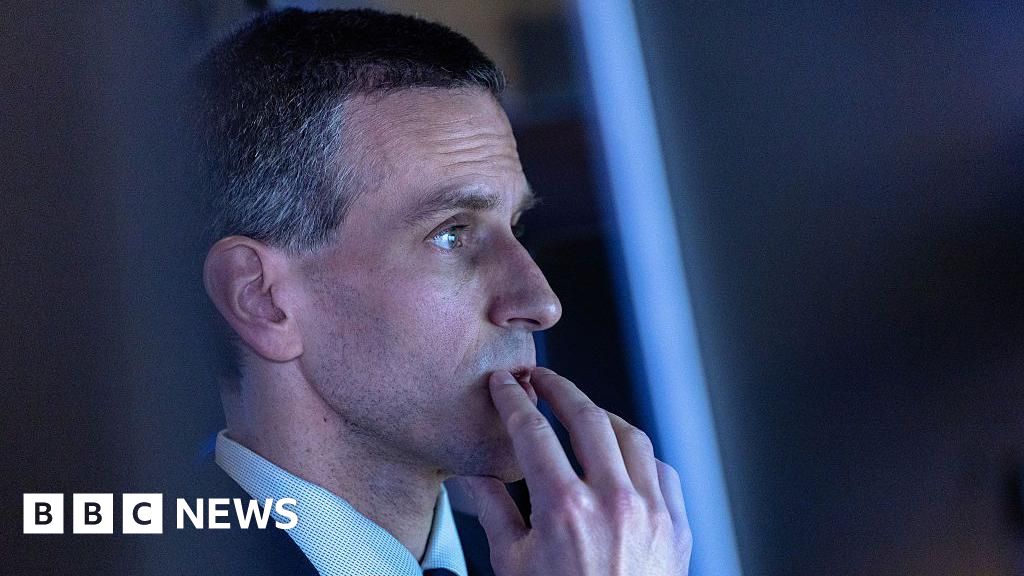BBC business reporter
 Getty Images
Getty ImagesStocks around the world sank on Thursday as questions about how businesses and households will swallow the cost of new, sweeping tariffs in the US raised concerns about economic downturn.
In the US, the S&P 500, which tracks 500 of the biggest American firms, was down roughly 3.5% in mid-day trade, as losses accelerated over the morning, with big consumer names such as Nike and Apple among the hardest hit.
The UK’s FTSE 100 share index ended down 1.5% and other European markets also dropped, echoing falls seen earlier in Asia.
While stocks fell, the price of gold, which is seen as a safer asset in times of turbulence, touched a record high.
US President Donald Trump said he would impose a 10% tax on imports from around the world, and higher duties on dozens of other countries, including key trade partners such as China and the European Union.
The new taxes include a 54% tariff on US imports from China and 46% on goods from Vietnam.
Markets across Asia fell sharply after Trump’s announcement, with the Nikkei in Japan closing down nearly 3% and Hong Kong’s Hang Seng index 1.5% lower.
Shares in Europe followed the downward trend, with Germany’s Dax index falling 3% by the end of the day and France’s Cac 40 dropping 3.3%.
The price of gold hit a record high of $3,167.57 an ounce at one point on Thursday, before falling back to $3,090.
In the US, the Dow Jones dropped 2.8% in mid-day trade, while the Nasdaq tumbled more than 4%.
The dollar also weakened against many other currencies. The pound rose by more than 1% against the US currency to touch $1.32 at one point before slipping back.
About a third of US imports, including goods from Canada and Mexico and items from key strategic sectors such as cars and steel, were not affected by Trump’s announcement on Wednesday.
But the White House said that was because Trump had already targeted them with separate tariffs, or plans to, as he doubles down on a high-stakes policy gambit aimed at reversing decades of liberalisation that shaped the global trade order.
Traders are concerned about the global economic impact of Trump’s tariffs, which they fear could stoke inflation and stall growth.
“This is the worst-case scenario,” said Jay Hatfield, chief executive at Infrastructure Capital Advisors.
Tariffs are taxes on imports. Analysts say firms now face a choice of swallowing the new cost, working with partners to share that burden – or passing it onto consumers, and risking a drop in sales.
That could have a major impact in the US and globally, where US consumer spending amounts to about 10% and 15% of the world economy, according to some economists’ estimates.
The measures could drag down growth in Europe by nearly a percentage point, with a further hit if the bloc retaliates, according to analysts at Principal Asset Management.
It said it now expected growth in China of roughly 4.2%, down from 4.5% predicted earlier this year.
In the US, a recession is likely to materialise without other changes, such as big tax cuts, which Trump has also promised, warned Seema Shah, chief global strategist at the firm.
She said that the inflation rate, currently at about 2.8%, could rise back to 4% by the end of the year.
“While the administration’s stated goal of the tariffs—reshoring manufacturing and the resulting capex boost to the economy—is certainly possibly, the reality is that the process will likely take years, if it happens at all,” she said
“In the meantime, the steep tariffs on imports are likely to be an immediate drag on the economy, with limited short-term benefit.”

Nike, which makes much of its sportswear in Asia, was among the hardest hit on the S&P, with shares down more than 11%.
Shares in Apple, which relies heavily on China and Taiwan, tumbled 7%.
Other retailers also fell, with electronics chain Best Buy slumping 15% and Target down roughly 10%.
Motorbike maker Harley-Davidson – which was subject of retaliatory tariffs by the EU during Trump’s first term as president and has been named as a potential target for retaliation this time – fell 7%.
In Europe, shares in sportswear firm Adidas fell more than 10%, while stocks in rival Puma tumbled more than 9% as key countries where their goods are made were hit with steep levies.
Among luxury goods firms, jewellery maker Pandora fell more than 10%, and LVMH (Louis Vuitton Moet Hennessy) dropped more than 3% after tariffs were imposed on the European Union and Switzerland.
Pandora said it expected the new tariffs to cost the firm roughly DKK 700m in 2025. It said it hoped to be able to reduce that hit, since about 250m DKK reflected goods that are sold in Canada and Latin America but shipped through the US.
It said it was “actively exploring” further action, “including price increases and supply chain set-up”.
Stellantis, which makes Jeep, Fiat and other brands, announced its own changes in response to the tariffs, saying it was temporarily halting production at a factory in Toluca, Mexico and Windsor, Canada.
It said the move would also lead to temporary layoffs of 900 people at five plants in the US that supply those factories.
“These are actions that we do not take lightly, but they are necessary given the current market dynamics,” Antonio Filosa, chief operating officer for the firm in North America, wrote in a message to the company.





